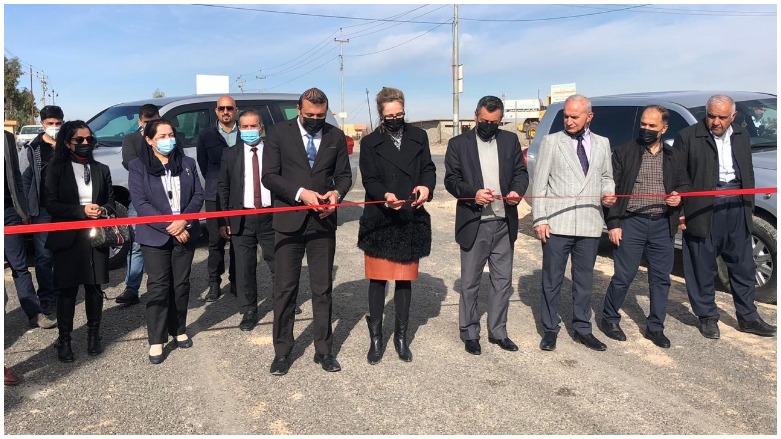Old Erbil-Kirkuk road restored to connect Kurdistan Region displacement camps

ERBIL (Kurdistan 24) – The Kurdistan Regional Government (KRG), with support from the Dutch consular officials, reopened the old Erbil-Kirkuk road on Thursday to link the city of Qushtapa with three surrounding displacement camps.
“The connection between the city and the camp is considered to be a vital element to attract potential investment,” Dutch Deputy Consul in Erbil Maaike Keizer told Kurdistan 24. “This 1,700 meter road is literally a milestone for further development in the region.”
Outside Qushtapa are three camps, known as Kawergosk, Darashakran, and Qushtapa, where thousands of Iraqis displaced by the Islamic State live, as well as Kurdish refugees from Syria and Iran.
“We are really proud to attend this ceremony today,” Keizer said. “And we believe that this road will benefit the people in the camps. So, there’s more ways for them to contribute to all the activities… in the neighborhoods and to get some jobs when all the shops are there to have more possibilities for their lives in the future.”
A Road to Opportunities: connecting refugee camps to the city of Qushtapa to increase access to job opportunities and basic services.
— Maaike Keizer (@maaikekeizer) January 8, 2021
Proud of cooperation with local government and technical support of Dutch experts.#openingceremony #LOGOREP #VNG #DRC pic.twitter.com/gmPxmNOY2D
The restoration of the road is part of the LOGOREP II program, funded by the Kingdom of the Netherlands and implemented by the Association of Netherlands Municipalities (VNG), the Danish Refugee Council (DRC), and the KRG Ministry of Municipalities.
The Kurdistan Region is home to over one million refugees and internally displaced persons (IDPs)who live in host communities and camps where the KRG, along with international and local aid groups, provides basic services such as electricity, health care, education, and security.
According to the KRG's Joint Crisis Coordination Centre (JCC), there are around 800,000 IDPs and 265,000 refugees who now live within the Kurdistan Region on which it spends some $78 million monthly in services and aid.
The LOGOREP II program has the broader purpose of connecting long-term humanitarian aid and development in the area, the first time local Kurdish authorities are developing visions for themselves with the technical support of Dutch experts.
“Future activities should lead to better access of host communities, internally displaced people and refugees to job opportunities and basic services,” Keizer concluded.
Editing by John J. Catherine